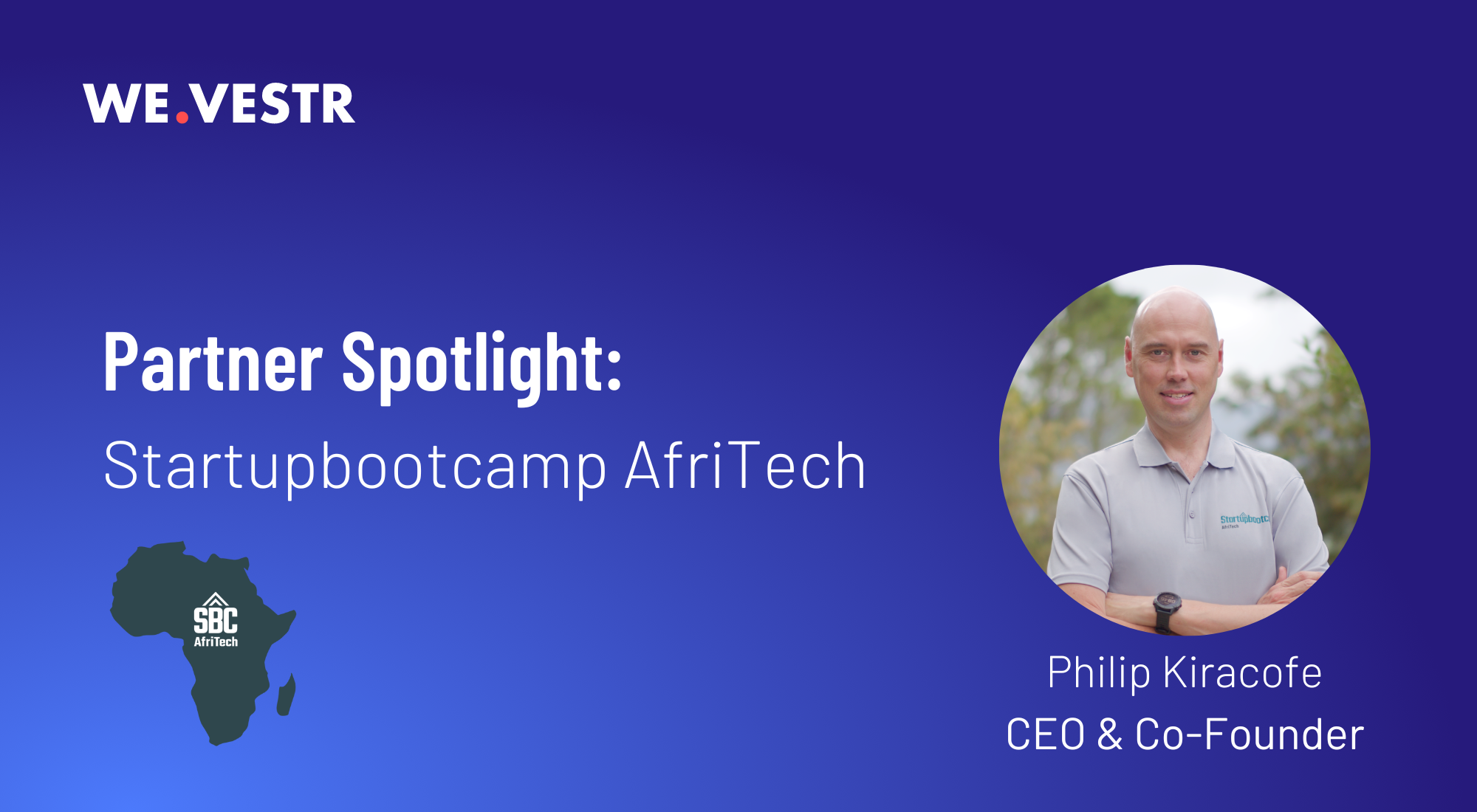Partner Spotlight: Startupbootcamp AfriTech

This month we spotlight Startupbootcamp AfriTech and hear from their CEO Philip Kiracofe, about how the African startup scene has evolved over the past 10 years and what he believes could lie in the future of this emerging regional powerhouse.
Looking back, what brought you into the African startup ecosystem?
I’ve been in the venture capital space for almost three decades now, starting off in New York where we saw the first of the emerging markets including the dotcom era. Having been through three cycles of these, I’ve seen and learned quite a bit about what works and what key ingredients you need to nurture an emerging market and nowhere moreso, than when I stumbled into the rapidly growing tech scene in India. This was following on from a US/Indian fund that I was part of at the time and that led to a very exciting partnership with Softbank.
More significantly for me at the time, it meant that I got to see the rise of the Indian emerging economy first hand. Not only through the lens of a VC, but also through the learnings from those prior cycles in emerging markets (albeit contextually different), and I began to see where I could possibly have some impact.
After that, I naturally gravitated towards developing other emerging markets, which led me into the African startup scene, still in its nascent stage back then and where Zach George and I eventually launched the first African accelerator, Tech Lab Africa, in 2015 followed by another accelerator in 2016.
What was that early experience like?
My original intention was to set up a VC fund in Africa but we quickly realised the market conditions in Africa needed something much broader. So we started advising startups and educating the market on how to scale startups. In the process we were learning fast what investing in the African ecosystem actually looked like and also started getting excited about what it could look like in the future. That's when we met the Startupbootcamp team. At that time they had a significant global presence but nothing yet in Africa, so it was a very fortuitous meeting that led Zach and I to launch SBC AfriTech in 2017.
Since we launched, we’ve had:
- more than 70 startups go through our programmes
- 90% of those are still operating, which is a remarkable achievement
- 50% of those have never needed any additional dilutive funding and are self-sustaining through commercial contracts, which is not just remarkable for Africa but for any Accelerator program, anywhere in the world
- And in total they have raised more than $130M in USD. A phenomenal result for a rapidly growing ecosystem.
How have you found the African startup space to be different from its global peers?
For starters other international Accelerator Programs are typically run by themes, such as HealthTech, Fintech, Agritech and so forth. In Africa, we need to see the entire region as a sector in itself. Even though we might have a lot of fintech and agritech solutions, the regional challenges make the opportunity more nuanced, and needing a more regionally localised solution. In other words we need African solutions to African challenges. This is a foundational principle that has echoed into how we have chosen to scale our own business internally, so that we’re also representing the region we serve. It makes a difference to startups here when you can appreciate how different the approach needs to be for Africa.
If you think about Netflix or Amazon for example, they both benefited from an existing logistics, delivery and payments infrastructure that allowed them to scale at speed. If you tried to build a similar ecommerce platform opportunity here in Africa, that infrastructure is still very fragmented and unreliable across many markets. So you won’t just be thinking about solving your specific platform solution, but how to solve the full stack from payments to bandwidth to logistics to customer service, all of which must be solved in order to deliver your solution.
Having to solve the entire pie is nearly impossible for any one single startup. So we have started building our Accelerator cohorts around complimentary startups that can focus on their link in the chain and work together to solve the full value chain.
What is the Constellation Approach?
We call this comprehensive view the Constellation Approach - because individual stars arranged into recognizable constellations have inspired humanity since the dawn of time. We believe that this approach will be the key to unlocking rapid scaling in Africa.
We look for startups that can collaborate in solving the full stack of a given opportunity, and who can together as a cluster -as a constellation- deliver a comprehensive solution.
In Senegal for example, we had farmers who had a big problem where they were harvesting goods they couldn’t shift to market at a competitive rate. At the time they were receiving around 10-20% of the market value, because of a lack of market access and refrigeration options for food conservation. Our alumni startup LIMAWA, came up with a novel solution for solar-powered cooling units that could reach -2℃ and be installed in vehicles of all sizes, notably tricycles that could reach remote areas. A great solution on its own but when paired with SafeTrack who deliver sensors that enable quality prediction, we saw a 5x value increase not just for the farmers but also saw the retailers who were now also getting a better price.
How does the Constellation Approach work?
We run these constellations through customer discovery programmes in partnership with various partners (Telecel Group, La DER, FMO: Dutch Entrepreneurial Development Bank, Senegalese Ministry of Agriculture etc) and then we find the startups that can solve the challenges identified in that journey. We receive an average of 2000 applications per year (more than 14,000 over the last 7 years) so we have one of the most extensive perspectives on true innovation. For example, we might find a startup with a novel solution that could work for a bigger problem, which is always very exciting when you can see a wider opportunity that the startup doesn’t know they could be solving.
A lot of the time, our work involves addressing the unsexy plumbing problems. To go back to our earlier example of Amazon and Netflix, we need to build the value chain infrastructure, along with the solution. Which on face value may sound discouraging but the result has been true innovation (borne out of necessity) that can actually be scaled beyond its immediate regional fit. Take Yobante as an example. They’ve created a courier service leveraging a distributed mesh network (which is point to point delivery of goods at low cost). In 2019, they were operating from a single market (Senegal). They’ve now gone on to scale this across 22 other countries on 3 continents delivering more than 2.6 Million parcels last year. Remarkably, every package is guaranteed and insured.
Is logistics then, where you see African innovation being exported internationally, in the future?
It’s one of many areas. Fintech is another more obvious area where we’ve already seen African innovation leading the way. What many people don’t know, for example, is that mobile money was actually invented here in Africa by rural customers who struggled with a consistent pain point - reliable access to the scratch-cards used to top-up their airtime. Some enterprising individuals realized that they could send the 16 digit code as an SMS message and the recipient could then top up their phones. It was a small step to then create informal arrangements with the shopkeepers to barter unused airtime for food items and other essentials and this was the genesis of digital money - the first widespread platform for sending payments. This was eventually formalized by M-Pesa and became the first digital exchange of money. They just did it in a really clever and efficient way and now it's a globally adopted solution.
In just a few short years, this has exploded into an entire industry of neo-banks that are challenging the conventional physical banks around the world. We are proud to have as one of our alumni Kuda which is the largest and most successful digital bank in Africa, serving more than 7 Million customers.
And finally, where do you see the next big opportunity for African startup’s to impact innovation?
Generative AI is absolutely on our radar and where you can expect some very novel solutions to be coming out of Africa very soon. While OpenAI tends to generate most of the attention, there are homegrown deeptech solutions right here in Africa. One of the most inspiring is InstaDeep, a Tunisian startup that was acquired by BioNTech in 2023. They have offices from Carthage to Cape Town and provide worldclass AI technology solutions.
Finally, we see a much bigger opportunity for startups that are building their solutions on top of the AI platforms. Founders can now address problems with solutions that would have been unimaginable just a few years or even months ago, and the platforms are very inexpensive and widely available, which gives startups the opportunity to test, pivot, and scale much faster than ever before. We expect to see an incredible explosion of disruption across the continent in the near future, and are on the lookout for startups that we can help accelerate.
Philip Kiracofe is the CEO and Co-Founder of Startupbootcamp AfriTech and brings three decades of direct operational and venture financing experience spanning a diverse range of industries across three continents. He has co-founded, led, advised and invested in disruptive companies including a pioneer online grocery service company, the first large-scale social networking site, and three venture capital funds. He co-founded the first world-class accelerator on the African continent, and is the CEO and co-founder of Startupbootcamp AfriTech. He has accelerated and/or invested in nearly 200 African startups since 2013.
Startupbootcamp AfriTech is a partner of WE.VESTR, the equity management tool designed by founders for founders, to support them in their startup journey from incorporation to exit.
